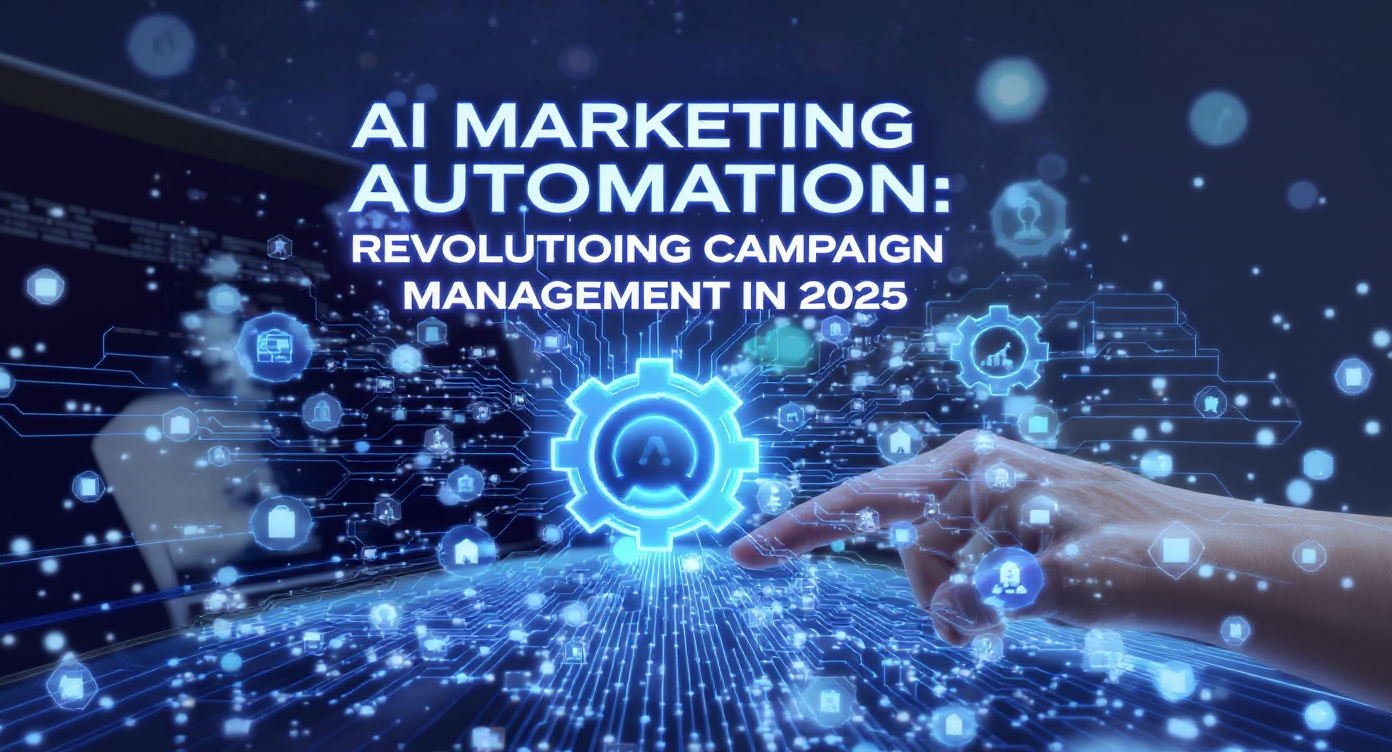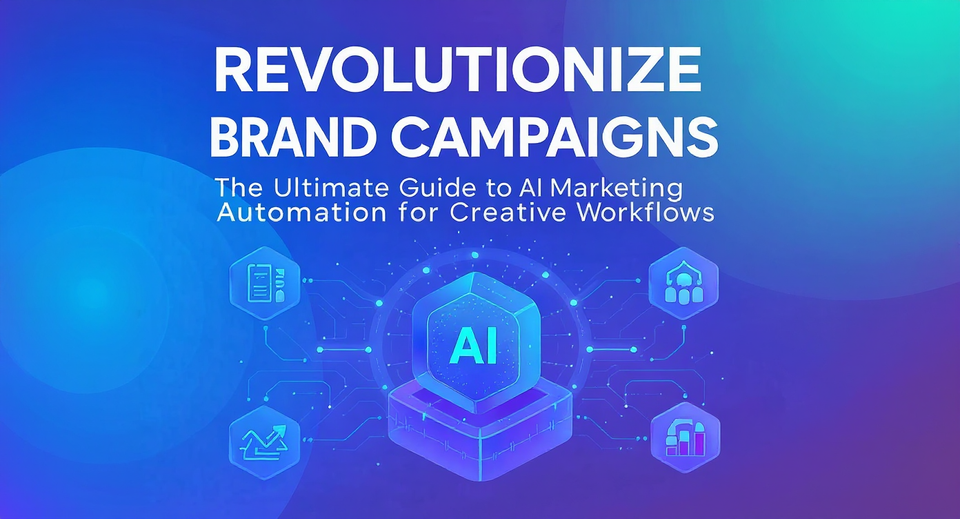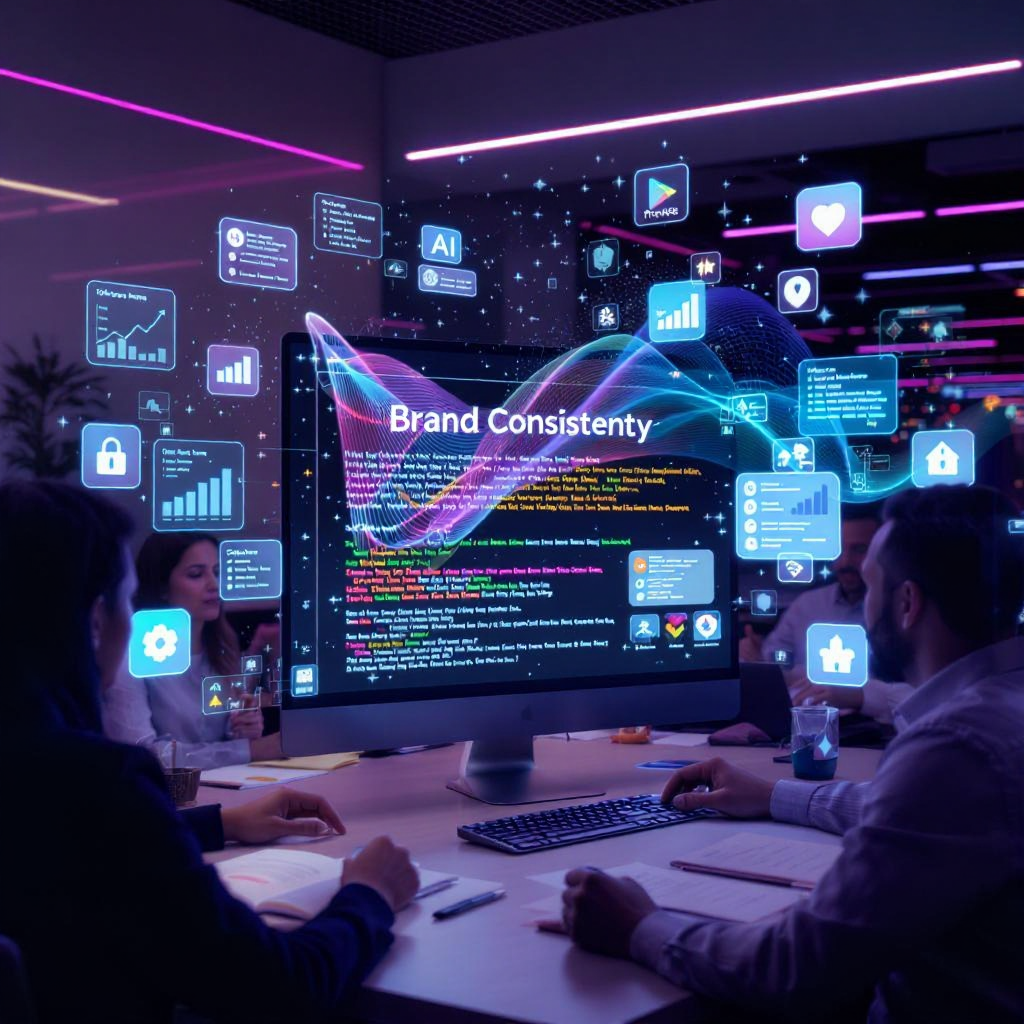AI Marketing Automation: Revolutionizing Campaign Management in 2025

AI marketing automation is fundamentally transforming how businesses approach their marketing strategies in 2025. By combining advanced artificial intelligence with sophisticated automation tools, companies can now execute complex, hyper-personalized marketing campaigns with unprecedented efficiency and precision.
What is AI Marketing Automation?
AI marketing automation refers to the use of artificial intelligence technologies to automate marketing tasks, analyze vast datasets, and make intelligent decisions with minimal human intervention. Unlike traditional marketing automation, AI-powered systems can learn from data patterns, adapt to changing market conditions in real-time, and make predictive decisions about customer behavior.
The AI in marketing market has experienced explosive growth, with the global market valued at $20.4 billion in 2024 and projected to reach $82.23 billion by 2030, growing at a CAGR of 25.0%. This rapid expansion reflects the increasing adoption of AI technologies across marketing departments worldwide.
Benefits of AI Marketing Automation
1. Enhanced Efficiency and Productivity
AI marketing automation eliminates repetitive tasks, with 74% of marketers reporting that saving time is the greatest benefit of automation software. Companies using marketing automation experience a 14.5% increase in sales productivity and can save up to 6 hours per week on routine tasks like social media posting and email marketing.
SurgeGrowth's AI-powered marketing platform exemplifies this benefit by automating the entire marketing campaign process from ideation to execution. Users can create on-brand campaigns quickly without relying on designers or writers, significantly reducing production time and resources.
2. Hyper-Personalization at Scale
AI systems can analyze vast amounts of customer data to deliver hyper-personalized experiences in real-time. This goes beyond basic personalization to create truly individualized experiences using AI-driven tools like Dynamic Yield and Persado that integrate behavioral and transactional data across multiple touchpoints. Research shows that 71% of consumers expect companies to deliver personalized interactions, and 76% get frustrated when it doesn't happen.
3. Data-Driven Decision Making and Predictive Analytics
AI-driven analytics have been shown to improve decision-making speed by 78%, while predictive analytics increase forecasting accuracy by 47%, leading to smarter budget allocation and campaign planning. Companies with aligned commerce strategies, marketing and sales processes, and automation see 32% higher annual revenue growth.
4. Significant Cost Reduction
By automating routine tasks and optimizing campaign performance, AI marketing automation can significantly reduce marketing costs. Companies report a 12.2% reduction in marketing overhead, and 60% of companies report an average saving of $300,000 annually through marketing automation tools.
Key Components of AI Marketing Automation
1. Generative AI Content Creation and Optimization
Generative AI has rapidly moved beyond the novelty stage to become an indispensable part of the marketing process. AI-powered content creation tools can now generate marketing copy, social media posts, videos, music, 3D visuals, and interactive content effortlessly, enabling marketers to create marketing materials much faster and launch new campaigns with ease.
SurgeGrowth's AI ad creative generator produces on-brand, editable AI ad creatives at scale. The platform can generate thousands of ads in seconds while maintaining brand consistency through its comprehensive Brand DNA system built from existing materials.
2. Advanced Customer Segmentation and Targeting
Generative AI algorithms can segment customers into groups based on common characteristics, behaviors, and preferences, enabling marketers to target specific audience segments with personalized marketing campaigns and offers, maximizing relevance and driving higher conversion rates.
3. Autonomous Campaign Management and Optimization
AI agents are evolving from simple task tools into autonomous collaborators that can manage entire marketing campaigns. Platforms like Omneky now deploy agents to generate, launch, and optimize omnichannel ads across Meta, Google, and TikTok. AI analyzes patterns like shopping habits, preferred communication channels, and engagement trends, and has the ability to adjust audiences on the fly based on new data or changes in customer behavior.
4. Real-Time Predictive Analytics
AI marketing platforms use advanced predictive analytics to forecast campaign outcomes, customer behavior, and market trends. This enables marketers to make proactive decisions rather than reactive ones, with marketing automation platforms powered by generative AI offering insights that inform strategic decision-making and campaign optimization by analyzing historical data and patterns.
How to Implement AI Marketing Automation
1. Assess Your Current Marketing Stack
Before implementing AI marketing automation, evaluate your existing tools and processes. With 76% of businesses already utilizing some form of marketing automation technology as part of their strategy in 2024, identify areas where AI enhancement could have the biggest impact on efficiency and results.
2. Define Clear Objectives
Establish specific goals for your AI marketing automation implementation. The most important strategic goals of a marketing automation strategy are increasing lead generation (61%), lead nurturing (57%) and sales revenue (47%). Whether you're looking to increase conversion rates or enhance customer retention, having clear objectives will guide your strategy.
3. Choose the Right AI-Powered Platform
Select an AI marketing automation platform that aligns with your business needs and integrates with your existing tools. 40% of businesses say that they intelligently automate up to 10% of their tasks, and 44% of businesses say they're learning about and exploring use cases of AI in marketing. Consider factors such as ease of use, AI capabilities, scalability, and available features.
4. Build Your AI-Ready Knowledge Base
For AI to effectively represent your brand, it needs access to your brand guidelines, voice, and existing marketing materials. SurgeGrowth's knowledge base feature allows businesses to store all images and brand context in one place, which can then be passed on to AI systems for content creation.
5. Start Small and Scale Strategically
Begin with a pilot project to test the effectiveness of your AI marketing automation implementation. The adoption rate for marketing automation tools is expected to rise significantly, with projections indicating that around 80-90% of companies will be using some form of it by the end of 2025.
Measuring Success with AI Marketing Automation
1. Key Performance Indicators (KPIs)
Track relevant KPIs such as conversion rates, customer acquisition costs, and ROI to measure the impact of your AI marketing automation efforts. Companies using AI-driven automation report higher conversion rates due to improved personalization, with automated emails generating 320% more revenue than non-automated campaigns.
2. AI-Enhanced A/B Testing
Use AI-powered A/B testing to compare the performance of AI-generated content and campaigns against traditional approaches. Tools like Adobe Target can show different headlines to different groups of people and tell you which one gets more clicks or sales, with much of the manual labor removed from the process.
3. Real-Time Customer Feedback Analysis
Collect and analyze customer feedback using AI to ensure that automated marketing efforts are resonating with your audience. 82% of consumers are more likely to engage with personalized content generated by automation.
Future Trends in AI Marketing Automation
1. Agentic AI and Autonomous Marketing
Agentic AI for multi-step processes is set to transform marketing decision-making, with AI agents capable of managing entire campaign lifecycles autonomously while maintaining human oversight for strategic decisions.
2. AI-Enhanced AR Integration
The integration of AI with augmented reality (AR) is an emerging trend set to impact marketing significantly. AI-enhanced AR experiences will provide customers with interactive and immersive ways to engage with products and brands, with companies like Snap Inc. and Shopify developing AI-enhanced AR features.
3. Advanced Predictive Customer Journey Mapping
AI will increasingly enable predictive analytics that use machine learning to analyze historical data and make predictions about future outcomes, allowing marketers to predict entire customer journeys and automatically adjust marketing strategies to guide prospects toward conversion.
4. Synthetic Media and Dynamic Content
Synthetic personas for cost-effective research and democratized data are emerging trends, giving marketers better access to decision-making insights. GAI and conversational search are reshaping digital marketing, making content creation at scale more achievable than ever before.
Transform Your Marketing Strategy with SurgeGrowth
Ready to revolutionize your marketing efforts? SurgeGrowth offers an AI-powered marketing platform that serves as an extended marketing team for your business. The platform automates the entire marketing campaign process while ensuring all AI-generated content maintains perfect brand consistency through its comprehensive Brand DNA system.
Key features include an AI ad creative generator that produces thousands of on-brand ads in seconds and a knowledge base that stores all your brand assets and context for seamless AI integration. Experience the same quality output as traditional marketing teams but with greater speed, lower cost, and less friction.
Conclusion
AI marketing automation is no longer a futuristic concept but a present-day necessity for businesses looking to stay competitive. With 88% of marketers reporting the use of AI in their daily operations as of 2025, and the global AI in marketing market projected to reach $47.32 billion in 2025.
By leveraging AI technologies to automate routine tasks, analyze data, and optimize campaigns, marketers can achieve better results while freeing up time for strategic thinking and creative work. The key is finding the right balance between automation and human creativity, ensuring that marketing doesn't lose its human touch while embracing AI as an essential tool for delivering meaningful, personalized experiences at scale.
As AI continues to evolve, the capabilities of marketing automation platforms will expand exponentially, offering even more opportunities for businesses to connect with their audiences in meaningful ways. Companies that embrace these technologies now will be well-positioned to lead in the increasingly digital and data-driven marketing landscape of the future.
FAQs:
Q: What is the difference between traditional marketing automation and AI marketing automation?
A: Traditional marketing automation follows pre-set rules and workflows, while AI marketing automation can learn from data, adapt to changing conditions in real-time, and make predictive decisions about customer behavior without human intervention. AI systems can also generate content, optimize campaigns autonomously, and provide hyper-personalized experiences at scale.
Q: How much can AI marketing automation reduce marketing costs in 2025?
A: Companies report significant cost savings with AI marketing automation, including a 12.2% reduction in marketing overhead, up to $300,000 in annual savings, and automated workflows that can reduce operational costs while increasing sales productivity by 14.5%.
Q: Do I need technical expertise to implement AI marketing automation?
A: While some technical knowledge is helpful, many modern AI marketing platforms are designed with user-friendly interfaces that require minimal technical expertise. With 88% of marketers now using AI in their daily operations, platforms have become more accessible and intuitive.
Q: How does AI maintain brand consistency in automated marketing?
A: AI systems like SurgeGrowth build a comprehensive Brand DNA from existing materials, ensuring all generated content adheres to brand guidelines and maintains consistency across campaigns. Advanced AI can analyze brand voice, visual elements, and messaging patterns to create on-brand content at scale.
Q: Can AI marketing automation work for small businesses?
A: Yes, AI marketing automation solutions are increasingly accessible for businesses of all sizes. Nearly half of small organizations have adopted marketing automation, with scalable options that can grow with your company's needs and budget. The democratization of AI tools has made sophisticated marketing capabilities available to smaller businesses that were previously only accessible to large corporations.
Citations:
- https://www.marketresearchfuture.com/reports/artificial-intelligence-marketing-market-6568
- https://www.contentgrip.com/future-ai-marketing/
- https://market.us/report/ai-in-marketing-market/
- https://www.grandviewresearch.com/industry-analysis/marketing-automation-software-market
- https://digitalmarketinginstitute.com/blog/10-eye-opening-ai-marketing-stats-in-2025
- https://www.grandviewresearch.com/industry-analysis/artificial-intelligence-marketing-market-report
- https://www.wordstream.com/blog/ai-marketing-trends-2025
- https://www.mckinsey.com/capabilities/growth-marketing-and-sales/our-insights/unlocking-the-next-frontier-of-personalized-marketing


